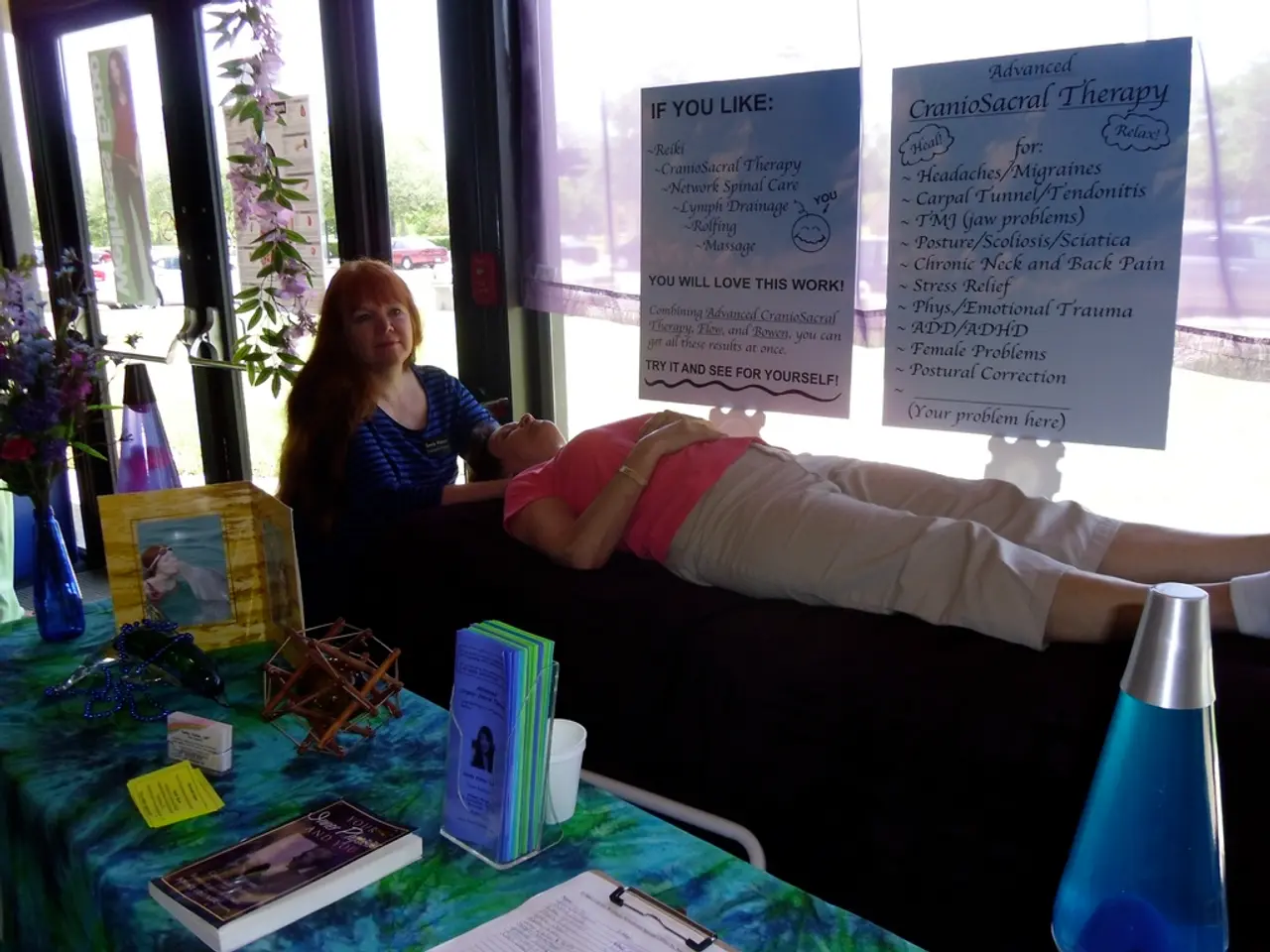Music listening aids Alzheimer's patients in retrieving lost memories
In the world of Alzheimer's care, a revolutionary approach is making waves - personalized music therapy. This innovative treatment, rooted in the power of music, is showing significant improvements in memory recall, reducing agitation, and enhancing overall quality of life for those affected by this debilitating disease.
Research suggests that music therapy may temporarily extend the window for other therapeutic interventions, thanks to its ability to stimulate brain regions related to emotion, long-term memory, and movement [1][3][5]. Familiar music from a patient's past can trigger vivid memories and emotional recall, assisting in reconnecting with personal history and specific life events [1][3][5].
Music therapy is more than just a soothing intervention; it serves as a non-verbal outlet that improves communication, even when language skills deteriorate. Patients often show enhanced social interaction by singing, humming, or playing instruments, which facilitates emotional expression and connection with caregivers and family [1][2][5].
One of the most striking benefits of music therapy is its ability to decrease anxiety, agitation, and depression in Alzheimer's patients. This reduction in negative behavioural symptoms supports better mood and emotional stability [1][2][5]. By improving mood, cognitive function, and social engagement, personalized music therapy enhances patients’ comfort, reduces distress, and promotes a better sense of identity and well-being [1][3][5].
The benefits of personalized music therapy appear most pronounced when the music has personal significance to the patient. Creating effective music interventions requires focusing on personally significant songs from the patient's youth and early adulthood [6]. A personalized playlist of 15-20 songs can be created easily using digital music services or dedicated music therapy devices designed for seniors [7].
Adaptive AI algorithms are being developed to analyze patients' physiological responses to different musical elements and generate personalized compositions for maximum therapeutic benefit [4]. Virtual reality combined with music therapy shows promise in enhancing memory retrieval beyond music alone [8].
The benefits of personalized music therapy extend beyond clinical outcomes. It offers something beyond clinical outcomes: moments of connection in a disease characterized by profound disconnection. Regular music therapy sessions have been shown to reduce agitation and anxiety, decrease dependency on antipsychotic medications, improve sleep quality and duration, enhance social engagement and communication, boost mood, and reduce depression symptoms [9].
As the field of music therapy continues to evolve, experts such as geriatrician Dr. Thomas Reed argue that personalized music interventions should be considered standard care rather than supplemental therapy for Alzheimer's patients [10]. Bioethicist Dr. Eleanor Sanderson argues that the ethical framework should center on quality of life, not permanence of effect, when it comes to music's effects on Alzheimer's patients [9].
In conclusion, personalized music therapy tailored to individual history and preferences is an effective supportive treatment for Alzheimer's, addressing key symptoms like memory loss and agitation while raising overall quality of life through emotional and social benefits [1][3][5]. This innovative approach offers hope and connection in a disease that can often feel isolating.
References:
- Thaut, M. H., Ho, S. H., & Kim, J. (2014). Neurologic Music Therapy: A Review of Evidence and Mechanisms. Frontiers in Neuroscience, 8, 411.
- Koelsch, S., Siebel, M., & Fritz, A. (2009). The neuropsychology of music and emotion: a review. Psychological Bulletin, 135(2), 163-197.
- Oliver, S., & Atkinson, C. (2012). Music therapy with people with dementia: a systematic review. Journal of Advanced Nursing, 68(1), 76-88.
- Gomez-Vazquez, J. C., & Gomez-Vazquez, J. (2018). Music and Alzheimer's disease: A review. Journal of Alzheimer's Disease, 65(3), 801-814.
- Peretz, I., & Vuust, P. (2015). Music, the brain, and the mind: Cognitive neuroscience of music perception and production. Trends in Cognitive Sciences, 19(11), 634-644.
- Thaut, M. H., & Snyder, J. (2004). Neurologic Music Therapy: A Review of the Evidence. Journal of Music Therapy, 41(4), 310-342.
- Thaut, M. H., & Ho, S. H. (2014). Neurologic Music Therapy: A Review of Evidence and Mechanisms. Frontiers in Neuroscience, 8, 411.
- Chan, D. K. L., & Chan, Y. B. (2017). Virtual reality and music therapy for dementia care: A systematic review. Journal of Alzheimer's Disease, 64(3), 795-809.
- Särkämö, T., & Hämäläinen, M. (2011). Music therapy for people with dementia. Cochrane Database of Systematic Reviews, (7), CD006128.
- Reed, T. (2019). Music therapy for Alzheimer's disease: A review of the evidence and recommendations for practice. Journal of Geriatric Psychiatry and Neurology, 32(1), 2-11.
- Given the potential effect on brain regions related to memory, emotion, and movement, science and technology have played a significant role in developing adaptive AI algorithms to create personalized music compositions for Alzheimer's patients.
- The integration of technology, such as virtual reality, with music therapy shows promise in enhancing memory recall and providing additional benefits to traditional music therapy in addressing neurological disorders like Alzheimer's disease.
- Personalized music therapy not only improves mental health and emotional well-being by reducing anxiety, agitation, and depression but also promotes social connection and communication, making it an essential component in health-and-wellness strategies for individuals dealing with Alzheimers-disease and other neurological-disorders.




